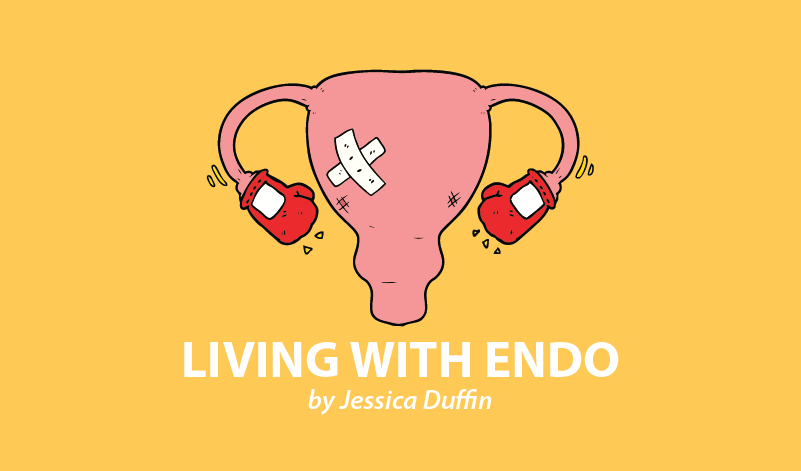Last night, I had a chat with a friend who has endometriosis. We run workshops together, and on Sunday she had a daylong retreat supporting women to get in touch with their feminine power. She’d been in bed for two days straight just before the event. And on Monday, she had a full-blown cold and was exhausted. She’d hit a brick wall, but had to push through.
We exchanged happenings in our life, and it became apparent that we are both burnt out. We’re both overachievers, and also perfectionists, with an inability to just “be.” And, on top of that, we are trying to do our best while living with a disease that keeps trying to drag us down.
Observing my Instagram feed, I’m becoming acutely aware of women with endometriosis who are doing their utmost to feel better and be the person they know they could be without the disease. Last week, I explored why women (especially millennials) are burning out quicker, and why I feel like those of us with endometriosis may be more susceptible to burnout — and my feedback echoes my theory. Of course, not every woman burns out, but it seems as if my feed keeps filling up with endo patients doing great things, but who are burning out every other week because they’ve pushed too hard.
So, many of us believe it’s all down to endometriosis, and I do think that we’d probably not burn out (so quickly at least) if we weren’t trying to be superwomen with endo on the side. But the symptoms of burnout are incredibly similar to endometriosis and could be mistaken for the disease alone. I’ve been treating my endometriosis symptoms for years, but this haunting sense of exhaustion, fatigue, depression, and anxiety always seems to creep back in. So, what if I’m treating the wrong illness? What if I looked at some of these symptoms as partly being to do with burnout? And could addressing these issues actually help me manage endometriosis better in the long run? After all, endometriosis is hard to deal with as it is, and even more so if you’re burnt out.
If this is ringing any bells with you, following are some symptoms of burnout. There are three classic stages for women, and within these stages are particular physical, mental, and emotional signs to be aware of.
Exhaustion: This can manifest in several ways, including chronic fatigue, insomnia, forgetfulness, or trouble concentrating, and physical issues like a tight chest, dizziness, illness, reduced appetite, anxiety, guilt, depression, and anger or irritability.
Cynicism: This includes pessimism, loss of enjoyment, whether at home or at work (though it usually will begin in your work life), isolating yourself, and feeling disconnected from people and things you once cared about.
Inefficacy: Generally, this manifests as real or perceived poor performance and a lack of productivity. It also can be a sense of failure or feeling undervalued, and can result in despair and apathy at work.
If you’d like more detailed explanations of these symptoms, I highly recommend checking out Psychology Today and Paula Davis Laack.
Some of you may know that I left my job in the summer as a result of struggling with my endometriosis symptoms —mainly, from what I thought was anxiety and chronic fatigue. Indeed, it was anxiety that was my worse enemy in this situation, but there are so many burnout symptoms that I can relate to and that resulted in me being unfit for work. The forgetfulness and trouble concentrating, the poor performance and feelings of failure, the despair, and the isolation — the list goes on.
Yes, these could be solely related to endometriosis, but I know that I’ve been burning the candle at both ends for a very long time. I’ve been looking at my forgetfulness and poor concentration as a mix of endo brain fog, fatigue, and anxiety, so I’ve been taking supplements to boost brain activity, meditating for anxiety, and approaching this from a completely endometriosis-based angle.
What I haven’t done is acknowledged that I might be doing too much. I haven’t booked in a holiday or reassessed how I live my life. So, yes, I may be helping these symptoms to a degree, but could I alleviate them even more by also assuming they are partly due to burnout? Both conditions are heightened by chronic stress and are supported by making positive lifestyle changes, and so treating one will most likely positively affect the other.
So, now begins the journey to recovery.
Have you burnt out or feel like you’re about to? Do you feel as if endometriosis is making you more susceptible to burn out? I would love to hear your thoughts and any ways you have found to manage it.
***
Note: Endometriosis News is strictly a news and information website about the disease. It does not provide medical advice, diagnosis, or treatment. This content is not intended to be a substitute for professional medical advice, diagnosis, or treatment. Always seek the advice of your physician or other qualified health provider with any questions you may have regarding a medical condition. Never disregard professional medical advice or delay in seeking it because of something you have read on this website. The opinions expressed in this column are not those of Endometriosis News or its parent company, BioNews Services, and are intended to spark discussion about issues pertaining to endometriosis.


